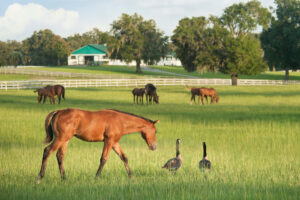Study: Slow-Releasing Deslorelin Delays Mares’ Heat Cycles

Deslorelin, in the form of a slow-release implant, successfully keeps pony mares from having estrus behavior and coming into heat, said Christine Aurich, DVM, PhD, head of the Graf Lehndorff Institute, in Neustadt, Germany, and professor of artificial insemination and embryo transfer in the Vetmeduni veterinary school Department for Small Animals and Horses, in Vienna, Austria.
It’s the same pharmaceutical product as that used in the commercial drug Ovuplant, which stimulates ovulation within 48 hours for well-timed breeding, she said. But when veterinarians administer deslorelin at different doses over different periods, it can have opposite effects.
“Deslorelin is a GnRH agonist, which means it’s a drug that stimulates pituitary secretion and synthesis of the luteinizing hormone (LH) and follicle-stimulating hormone (FSH) gonadotrophins,” Aurich said. “In mares, LH stimulates ovulation and luteal function (creating a good environment for the embryo)
Create a free account with TheHorse.com to view this content.
TheHorse.com is home to thousands of free articles about horse health care. In order to access some of our exclusive free content, you must be signed into TheHorse.com.
Start your free account today!
Already have an account?
and continue reading.

Related Articles
Stay on top of the most recent Horse Health news with

















